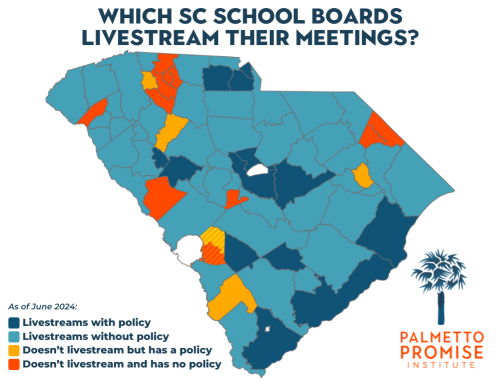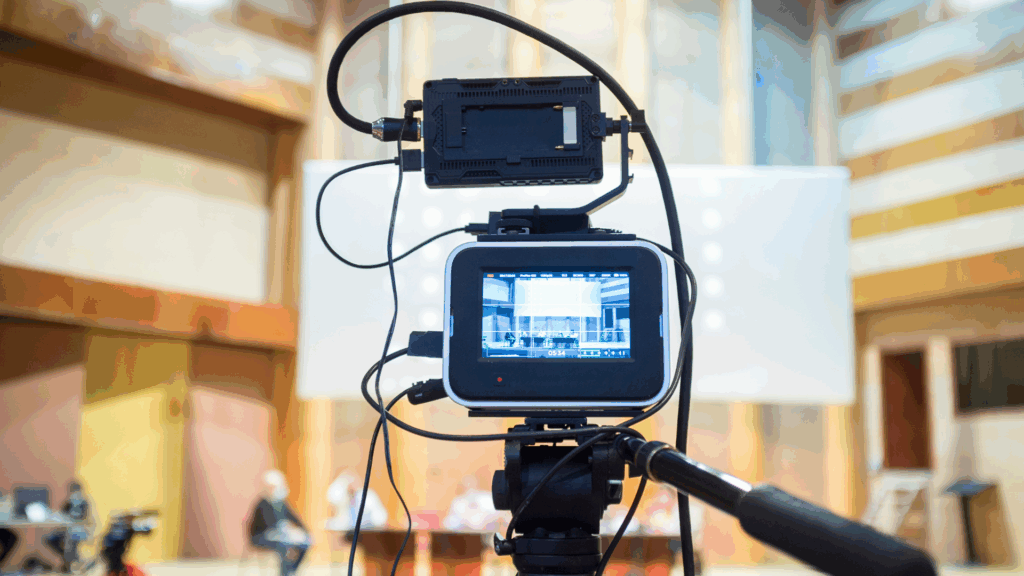The following is a guest contribution by Felicity Ropp, Policy Analyst at the Palmetto Promise Institute
South Carolina is one step closer to citizens in every school district having easy, online access to the meetings of their local school boards.
During its August 5, 2025, meeting, the South Carolina State Board of Education passed new model policy language for local school boards to use in crafting their own policies regarding live-streaming of school board meetings. This comes after the South Carolina General Assembly passed S.77 (now in law as Act 28) this spring, which requires all public school boards to livestream their meetings. The law applies to all board meetings subject to FOIA—both full board and committee meetings. For many districts, that’s a significant change from livestreaming only the proceedings of the full board.
A study conducted by Palmetto Promise Institute in June 2024 found that South Carolina’s school boards overwhelmingly lack codified policies requiring livestreaming of meetings (this includes the 44 districts in teal and the 11 in dark orange on the map below). Further, 16 districts (in dark and light orange) do not provide online access to their meetings at all. This transparency deficit is why Palmetto Promise strongly supported S.77 and were proud to testify in favor of it.

That study examined only district school boards, not the boards of public charter schools and special schools. But those types of public schools are included within the scope of S.77’s livestreaming mandate as well. The State Board of Education is directed in S.77 to pass “a model livestream meeting policy suitable for governing bodies of public schools, including charter and special schools.”
Last week, the State Board finalized this model policy for school boards. Now, South Carolina’s public school boards have three months to comply and adopt their own local policies that, at a minimum, match the State Board’s model.
What to know about the model policy
- Meeting types covered: Includes regular, special-called, committee, subcommittee, workshops, budget hearings, and public hearings (excluding executive sessions).
- Permanent posting: Recordings must be posted to the board’s website within two days of the meeting, so those who missed watching it live can watch it back. This is something that the State Board does not yet do itself—as of this writing, we are still waiting on the recording of their August 5 meeting to be uploaded to their website. Hopefully this new policy will be followed by the State Board too!
- Sets quality standards: “Broadcast of livestreamed meetings must be of sufficient video and audio quality so that viewers can easily hear the comments and be able to identify who is making comments.” “All portions of livestreamed meetings must be visible and audible in real time.”
- Streaming platforms: A board may use services like Vimeo, YouTube, or Facebook Live if links are posted on its website.
- Public notice: Boards must advertise livestream availability prominently—so no one can hide the stream in a back page of the website.
Upon adopting their own local policies, school boards must, within thirty days, submit their policy to the State Superintendent for approval by the State Board. Local policies can only be adopted “at a regularly scheduled meeting, which must be successfully livestreamed,” and no livestream policy shall prevent or impede in-person participation by the public.
Consequences for Noncompliance
School boards in South Carolina must adopt local policies based on the State Board’s model policy by November 5, 2025. If they do not comply, the State Board has set tiers of penalties.
- For a first offense, technical guidance may be provided through the South Carolina Department of Education.
- For subsequent offenses, a warning will be issued, and the district may be required to submit a written plan to the South Carolina Department of Education with specific details on how they will attain compliance.
- Persistent and egregious violations may be referred to the State Board of Education for review, and penalties may be assessed. The board policy clarifies that financial penalties shall not exceed one percent of state funds to the district, charter school, or special school.
If a school district faces broadband access barriers to livestreaming its meetings, after showing “reasonable efforts to comply” with the law, the district is able to request a 12 month extension from the State Board for streaming meetings.
South Carolina Citizens, Get Ready
South Carolina citizens are best equipped to monitor whether or not their local school boards take swift action to comply with this new state law. Visit your school board’s website to see if they already livestream their meetings. If not, consider writing an email to your board member, letting them know about this new requirement and asking them to please sponsor a new state-compliant policy for the board to livestream all its meetings, whether full board meetings, committees, workshops, and hearings.
With this model policy now in place, the countdown to full transparency has begun. In three months, by November 5, every public school board in South Carolina—district, charter, and special—will be expected to open their doors digitally to the citizens they serve (and Palmetto Promise will be able to mark complete another priority in our Palmetto Freedom Agenda!). This is a major step toward ensuring parents, taxpayers, and community members can easily see how decisions are made that affect their schools. The law is clear, the timeline is short, and the opportunity for greater accountability is here. Now it’s up to each board—and the people who elect them—to make it happen.
***
Felicity Ropp is a policy analyst at Palmetto Promise Institute, which promotes policy solutions to advance a free and flourishing South Carolina, where every individual has the opportunity to reach their full, God-given potential.

